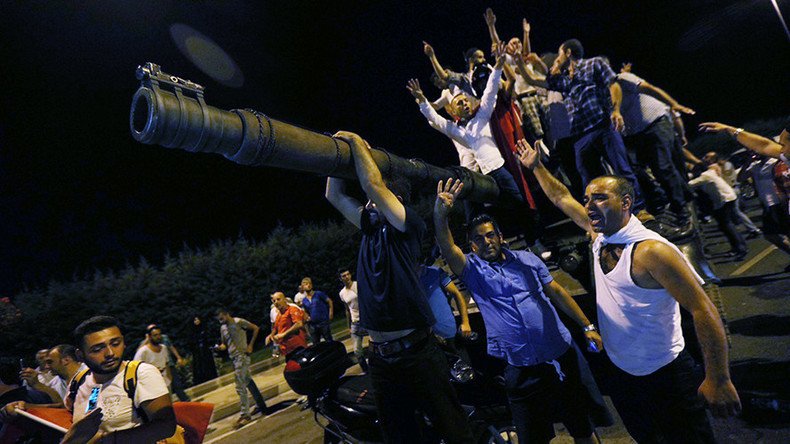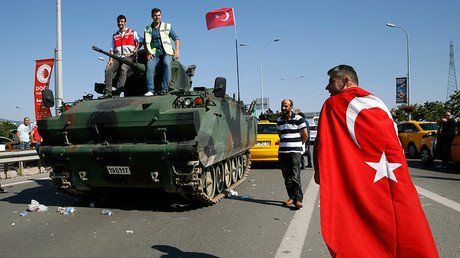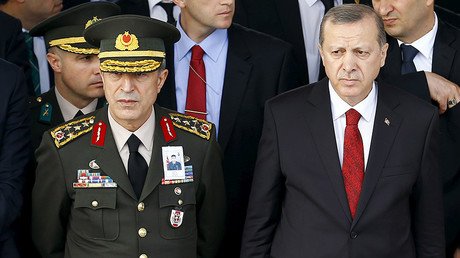Erdogan’s policies led to very fragile balance of civil unity, as coup reveals – analyst to RT

President Erdogan was always risking a state collapse by pursuing his repressive policies and befriending Islamism, political analyst Catherine Shakdam tells RT.
In this sense, the coup attempt isn’t all that surprising, Shakdam says, adding that Erdogan’s attempts to save his presidency instead of the actual country have compounded the problem. She calls these attempts “dangerous, because this could drive not just violence, but lead to a civil war. Turkey is not sitting pretty when it comes to civil unity. And this could quickly degenerate if the military doesn’t grab hold of the situation.”
Shakdam argues that Erdogan risked social upheaval by ignoring the pleas of his people and aggressively quashing any form of dissent, pushing the nation further towards the brink of desperation.
“Erdogan policies of ethnocentrism,” particularly with regard to the Kurds, “have played against him and could ultimately actually cost him his presidency, if not more.”
The US calls Turkey a “key NATO member,” and the country has the second largest military in the alliance after the Americans. It stands to reason that instability in Turkey will only further fan the flames of the situation Ankara created when it opened its doors to extremist groups like Islamic State [IS, formerly ISIS/ISIL], Shakdam believes.
With the government in disarray, she fears that terrorists could vie for control over parts of Turkey. And, of course, the Americans have an air base and nuclear weapons there too.
Another concern is that political alliances could now shift, particularly with respect to Washington’s attitude towards Syria and Turkey’s relationship with Iran and Russia.
“It would be of Turkey’s interest again to make friends with Russia and Iran – and Syria, of course – and try to kind of disengage from what is happening in Syria.”
According to Shakdam, this could provide Turkey with the opportunity to reinvent itself politically and allow it to serve as “a bridge between East and West.”
“It would be a good thing for Turkey to be back to being neutral. Because we need to have some countries in the Middle East that are stable enough, big enough, with enough military power to be able to bring some sense into the situation.”
Erdogan to strengthen grip on Turkey
In the meantime, the failed coup attempt is likely to boost the popularity of Erdogan and thus allow him to tighten up his grip on Turkey and launch an even bigger crackdown on his opponents, several experts told RT.
“The major result of this [coup attempt] could be actually in Erdogan’s favor and even increase his popularity,” Ali Rizk, a Middle East expert, told RT, adding that the Turkish president, who “has always had his political aspirations to strengthen his grip on Turkey in general,” will probably use what happened on Friday “to achieve his political goals.”
Rizk also warned that “there is going to be a big clampdown” and the witch hunt “is going to intensify.”
“This could indeed transform Turkey from ‘a beacon of democracy’ into a police state. With these particular developments taking place, I do expect that Turkey will walk more and more on the way of an authoritarian police state,” he added.
His words were echoed by Jeremy Salt, an associate professor of Middle Eastern history and politics at Bilkent University in Ankara, who told RT that the coup will lead to an increase in Erdogan’s popularity and further suppression of political opposition, justified by the hunt for traitors.
“On top of this, we have ongoing prosecutions of a large number of parliamentarians, including many members of the pro-Kurdish People’s Democratic Party (HDP) but also other politicians as well. And in that climate, successful prosecutions are more likely,” Salt said.
At the same time, some believe that the Turkish president is losing support from the West. The fact that Western powers did not lend any significant assistance to Erdogan as a military faction tried to overthrow him shows that his support in the West is fading, Ali Rizk told RT.
“If such a coup had happened four or five years ago, we would have seen even Western military assistance for Erdogan. The fact that this did not happen this time does show the extent of indifference certain western leaders have to the Turkish president,” he believes.
The statements, views and opinions expressed in this column are solely those of the author and do not necessarily represent those of RT.














